Materials Test Lab Brilliance: Decoding Quality with Proficiency
Wiki Article
Putting Materials to the Examination: Discovering the Role of Materials Test Labs
Products test laboratories play a vital role in making certain the high quality and reliability of different products utilized in sectors such as manufacturing, building and construction, and aerospace. With a mix of advanced methods and customized equipment, products examination labs are able to examine the properties of metals, polymers, compounds, and various other materials under different problems and stress factors. This article will discover the importance of materials testing, the kinds of products tested, testing methods and devices made use of, as well as the applications of materials test results.Value of Materials Screening
Frequently evaluating the quality of materials is critical in making certain the honesty and security of products in numerous markets. Materials testing entails subjecting materials to various examinations and experiments to examine their mechanical, physical, and chemical residential properties.One of the key reasons why products screening is essential is the guarantee of item quality. With rigorous testing, suppliers can identify any flaws or weak points in the materials used for their products.
By subjecting materials to different tests, manufacturers can establish their strength, toughness, and resistance to exterior elements such as heat, stress, or chemicals. Whether it is vehicle elements, clinical gadgets, or building products, products testing aids in determining any possible safety threats and establishing appropriate actions to alleviate them.
Kinds Of Products Evaluated
Numerous kinds of products are evaluated in products test laboratories to assess their mechanical, physical, and chemical properties. These products can encompass a variety of compounds, including metals, polymers, porcelains, composites, and also all-natural materials such as timber and concrete.Steels are generally examined due to their prevalent usage in numerous sectors. Compounds, which consist of two or more different materials, are reviewed to recognize their total efficiency, consisting of aspects like toughness, versatility, and strength.
Natural materials like timber are evaluated to evaluate their stamina, wetness material, and resistance to decay (materials test lab). Concrete is an additional frequently tested material, with tests concentrating on its compressive stamina, durability, and resistance to environmental factors
Along with these products, materials examination labs likewise review coatings, paints, adhesives, and numerous other products made use of in construction, manufacturing, and other markets. By subjecting these materials to extensive testing, scientists and designers can gather valuable information to inform product option, design optimization, and quality assurance procedures.
Testing Strategies and Devices
Checking strategies and equipment play a crucial function in products test laboratories for assessing the mechanical, physical, and chemical residential or commercial properties of various products. These strategies and tools are vital in ensuring the top quality, reliability, and safety of products utilized in numerous industries such as aerospace, vehicle, construction, and clinical.One generally used screening strategy in products examination laboratories is mechanical testing, which involves subjecting products to different pressures or loads to determine their stamina, solidity, ductility, and various other mechanical properties. This is usually done making use of tools such as global screening machines, which can apply tensile, compressive, and bending pressures to examine specimens.
Physical testing techniques are also utilized to examine residential or commercial properties such as density, thickness, thermal conductivity, and electric conductivity. Tools such as thickness meters, viscometers, thermal conductivity analyzers, and electrical conductivity meters are utilized to execute these examinations accurately.
Chemical screening strategies are utilized to find determine the chemical make-up and purity of materials. Techniques such as chromatography, spectroscopy, and mass spectrometry are generally made use of, together with customized equipment made for these purposes.

Applications of Products Test Outcomes
The results of products checking supply important understandings right into the efficiency and suitability of different products for details applications in various sectors - materials test lab. These examination results play an important role in establishing the top quality, longevity, and safety of products made use of in manufacturing proceduresOne of the vital applications of products test results is in the area of building. Architects and designers count on these outcomes to select ideal materials for constructing frameworks, such as bridges, high-rise buildings, and property buildings. By conducting examinations on materials like timber, steel, and concrete, they can make sure that these products satisfy the called for criteria and can endure different ecological conditions.
In the aerospace industry, products examination results are crucial in figuring out the viability of materials for airplane parts. By subjecting materials to extensive testing, engineers can analyze their mechanical residential or commercial properties, resistance to warm and deterioration, and capability to stand up to high-stress conditions. This info is essential in guaranteeing the safety and integrity of aircraft.

Future Trends in Materials Screening
In the realm of materials screening, innovations in products checking methods are shaping the trajectory of the field, ushering in a brand-new age of advancement and precision. One future trend in products testing is the integration of artificial knowledge (AI) and maker discovering algorithms right into screening processes. These approaches permit for the assessment of material properties without creating damage or alteration to the example, making them optimal for evaluating beneficial or irreplaceable materials.Verdict
In final thought, products screening plays an essential function in numerous sectors by ensuring the high quality, security, read this post here and efficiency of products made use of in items and frameworks. The results obtained from materials testing are utilized to make educated choices in product choice, layout, and manufacturing procedures.With a mix of sophisticated techniques and customized devices, materials test labs are able to evaluate the homes of metals, polymers, composites, and other products under numerous problems and stressors. By carrying out tests on products like lumber, steel, and concrete, they can guarantee that these materials fulfill the called for requirements and can endure various ecological problems.
In the aerospace market, materials examination results are vital in identifying the viability of products for aircraft parts. By checking materials for their adaptability, stamina, and resistance to influence, producers can select the most appropriate materials for various automobile parts, such as body panels, engine parts, and safety functions.In the realm of products testing, improvements in materials checking approaches are forming the trajectory of the field, ushering in a brand-new era of advancement and precision.
Report this wiki page